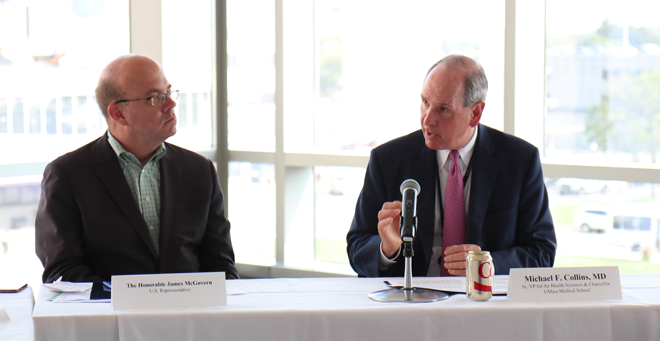 |
|
|
U.S. Rep. Jim McGovern, left, listens as Chancellor Michael F. Collins speaks at the forum on NIH funding at UMMS. |
President Donald Trump’s proposal to cut 22 percent from the FY18 National Institutes of Health budget would cost UMass Medical School between $45 million to $74 million a year, Chancellor Michael F. Collins said at an Aug. 16 panel discussion on NIH funding at UMass Medical School, according to media reports in the Worcester Telegram & Gazette, Worcester Magazine and Charter TV3’s Worcester News Tonight.
“We are deeply concerned with the cuts proposed by the president and the impact it could have on innovation, medical progress and the local economy,” Chancellor Collins said, adding that the reduction would amount to a loss of $103.5 million to $169 million to the local economy. ”This is a critical time for our country in terms of the future viability nationally of our medical research sector. It is a critical time for this institution and city, given how important this sector is to our economy.”
UMass Medical School’s research portfolio is $253.7 million, of which $151.3 million is from the NIH. UMMS is 29th in NIH funding out of nearly 150 accredited medical schools. NIH-funded research at UMMS generates $348 million to the state’s economy. Its entire research portfolio has a $584 million impact on the state.
“Scientific research to Massachusetts and Worcester is what citrus growing is to Florida or auto production is to Michigan,” U.S. Rep. James P. McGovern, D-Worcester, said, as reported in the Telegram article.
Worcester City Manager Edward Augustus said, “Your health and vitality as an institution are inextricably linked to our health and vitality as a city.”
Also representing Worcester on the panel were Massachusetts Representative James O’Day, D-Worcester (14th District) and Worcester Mayor Joseph Petty, as well as UMMS participants Terence R. Flotte, MD, the Celia and Isaac Haidak Professor of Medical Education, executive deputy chancellor, provost and dean of the School of Medicine; Anastasia Khvorova, PhD, professor of RNAi therapeutics; and Beth McCormick, PhD, vice chair and professor of microbiology & physiological systems and founder of the UMass Center for Microbiome Research.
The event was streamed live on Facebook; a video of the discussion can be viewed here: https://www.facebook.com/umasschan/
Media coverage of the panel discussion:
Worcester Telegram & Gazette: Concern over NIH cuts unites Worcester’s medical school, political leaders
Charter TV3 Worcester News Tonight
McGovern blasts proposed Trump cuts to research funding at UMass round table